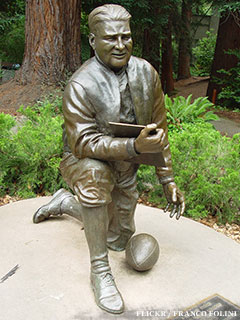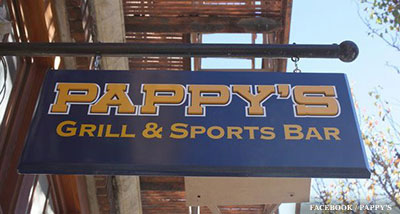Among the many forms of endearment that a man can hope for upon exiting his role as an iconic football coach at a major university, the highest honors are clearly the following: A stadium with your name on it, a statue on campus and being the namesake of a local sports bar or restaurant. For Pappy Waldorf, the head coach of the California Golden Bears from 1947 to 1956, two out of three ain't bad.
Though if you talk to the men who played for him, a group affectionately known as "Pappy's Boys" even though many are octogenarians, the statue on campus and the sports bar on Telegraph Avenue aren't nearly enough of a testament as to just how good of a coach and man Waldorf was.

"His presence was a thing to behold," says Jack Hart, a sophomore on Pappy's last Cal team. "He was so positive about everything. From his demeanor to the way he treated us. There was no ranting or raving. He was such a wonderful person who was consistent and fair and who expected us to do great things. I can honestly say that I don't remember ever hearing anything bad about him, not even by opposing players and coaches."
Fortunately for Waldorf, the football gods had their fingers crossed when it came to the typical "nice guys finish last" mantra. After all, there have been plenty of nice coaches run off college campuses because they couldn't make bowl games or they lost too many games to a school's rival. In Waldorf's case, those are the exact areas that he excelled.
"In the ten years that Pappy was at Cal, he won about 70 percent of his games," Hart says. "He was the conference champion three times, he played in three Rose Bowls and in those ten years, he only lost to our rival Stanford once. He also graduated over 90 percent of his players."
And this wasn't a situation where Waldorf took over the reins of a team that was brimming with talent.
The year prior to his arrival, the Golden Bears were 2-7 and had just finished their third straight season under .500. They had also suffered so many losses to Stanford in The Big Game that students were on the verge of rioting.

Lefty Stern, the sports editor for the Berkeley Gazette and one of the few non-athletes to enroll in the Waldorf's class on campus, remembers the year before the great coach's arrival very well.
"Frank Wickhorst, who coached Cal before Waldorf, turned out to be a disaster," says Stern who grew up in Berkeley, started going to Cal practices when he was 9. "In the Big Game against Stanford, people tore up several rows of seats they were so upset. Back then, the student governing body hired and fired the football coach, so it turned out that his young woman of 19 years old had to fire the head football coach. After that, we didn't hire a search committee like teams do today to find a head coach. The coaches of our other teams called around and talked to their friends about who might be available."
In this case, Cal's track coach at the time, Brutus Hamilton, was asked to help find a new head football coach. He knew Waldorf from their days at Kansas State together. After a brief meeting, Pappy agreed to leave Northwestern, where he had the most wins in school history, to coach the Golden Bears.
"I believe when he got to campus, he used the phrase, 'I'm going to wake a sleeping giant'," Stern says. "And that he did."
Waldorf's first campaign with Cal was the stuff football legends are made of. He took a team in shambles and lead them to a 9-1 record, including a last-second victory over rival Stanford in The Big Game.
Students, alumni and fans were thrilled. Not since Cal's Wonder Teams in the 1920s, when they went 50 games without a loss, had Berkeley brimmed with so much optimism for its squad. Then Waldorf topped himself and went to the Rose Bowl in back-to-back-to-back years.
"Those three Rose Bowl appearances are what everyone remembers," Stern says. "Five of the best stadium crowds in history were during his years and he only lost one home game in his first five seasons."

Waldorf ended up losing all three Rose Bowl appearances, but the mere act of qualifying for game after game was building a legacy and cementing his recruiting base.
"My final decision came down to Cal and Oregon," Hart says. "I grew up in Southern California and even though Southern Cal and UCLA had big presences down there, I got interested in Cal through those Rose Bowl teams. They had just started televising games and they had such a big impact on the school's image. Every year I'd see the Wise Waldorf of Strawberry Canyon and the beautiful scenery of their stadium, and it got my awareness up. Then I met Pappy on campus and he was a big reason for me going there."
Hart's decision to be loyal to his home state rather than attend Oregon would have a tremendous impact not only his football career, but his life. He is an active member of Pappy's Boys, a group dedicated to keeping the great man's legacy alive.
"Pappy's Boys is basically all the guys who played with Pappy," Hart explains. "It is a great alumni club, and we all take tremendous pride in having played for him. He was a marvelous human being."
With this kind of legacy, maybe a stadium with his name on it isn't out of the question.
-- Jon Finkel is the author of The Dadvantage: Stay In Shape On No Sleep With No Time And No Equipment. Follow him on Twitter @Jon_Finkel.





